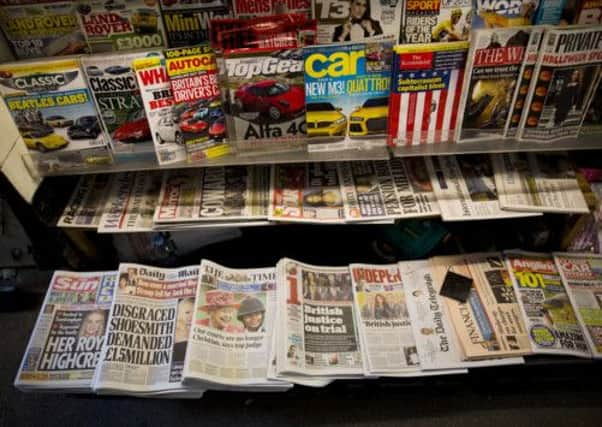Press defeat over royal charter on regulation


The Queen set her seal on the charter – backed by the Conservatives, Labour and the Liberal Democrats – at a meeting of the Privy Council last night.
The move establishes a recognition body intended to oversee a powerful new regulator set up by the industry. Ministers argue it offers the best way forward for the industry, while stopping short of full statutory regulation.
Advertisement
Hide AdAdvertisement
Hide AdBut industry sources indicated that a full appeal would be lodged within the next seven days against refusal of the High Court to grant a judicial review of a previous Privy Council
decision to reject an alternative charter put forward by the industry itself. Even if that appeal fails, it is clear some publications will simply refuse to sign up to a system underpinned by the politicians’ charter, despite threat of exemplary damages in any court action they are involved in if they do not.
A Department for Culture, Media and Sport spokesman said: “The Privy Council has granted the cross-party Royal Charter. Both the industry and the government agree independent self-regulation of the press is the way forward and that a Royal Charter is the best framework.
“The question that remains is how it will work in practice; we will continue to work with the industry, as we always have.
“A Royal Charter will protect freedom of the press while offering real redress when mistakes are made. Importantly, it is the best way of resisting full statutory regulation that others have tried to impose.”
In a joint statement, the Newspaper Society, the Newspaper Publishers Association, the Scottish Newspaper Society and the Professional Publishers Association, said they were “deeply disappointed” with the rulings by the courts.
The Privy Council meeting, held at Buckingham Palace, was attended by Deputy Prime Minister Nick Clegg, Health Secretary Jeremy Hunt, Culture Secretary Maria Miller and the Liberal Democrat justice minister Lord McNally of Blackpool.
The announcement came at the end of a day of high drama in the courts. After the High Court rejected an application by newspaper and magazine publishers to block the charter, the industry took its case to the Court of Appeal.
Advertisement
Hide AdAdvertisement
Hide AdBut at 4:45pm – just 45 minutes before the Privy Council was due to meet – news came that Lord Dyson, Master of the Rolls, sitting with two other Court of Appeal judges, had refused to grant an injunction pending further legal action.
Shortly before the Privy Council met, the government announced a final flurry of amendments in an attempt to allay industry concerns. They included a requirement that any future changes to the charter would require the unanimous agreement of the recognition body’s board, as well as a two-thirds majority of both Houses of Parliament.
Hacked Off, the group that has led the campaign for tighter regulation, welcomed the announcement, saying it would enable the recommendations of the Leveson inquiry into press standards to be implemented.
“News publishers now have a great opportunity to join a scheme that will not only give the public better protection from press abuses, but will also uphold freedom of expression, protect investigative journalism and benefit papers financially,” a spokesman said.
“The press should seize the chance to show the public they do not fear being held to decent ethical standards.”
READ MORE